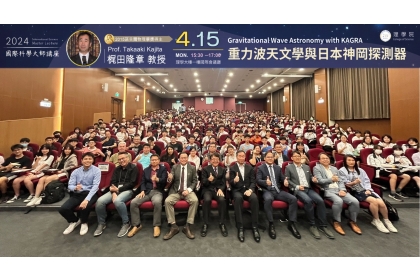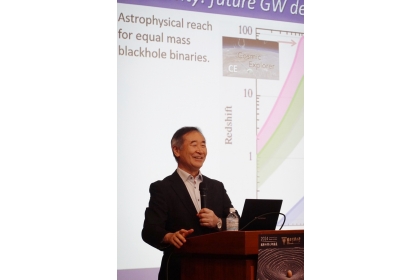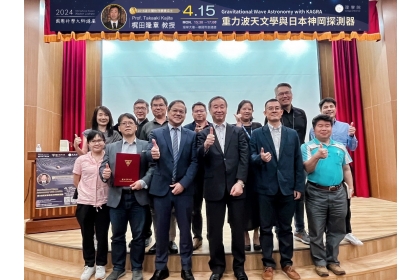Nobel Prize laureate Professor Takaaki Kajita discussed Gravitational Wave Astronomy with KAGRA
2024-04-22
興新聞張貼者
Unit秘書室
1,684
On April 15, 2024, the National Chung Hsing University College of Science hosted an International Science Master Lecture, featuring Professor Takaaki Kajita, the 2015 Nobel laureate in Physics and Director of the Institute for Cosmic Ray Research at the University of Tokyo. His presentation, centered on “Gravitational Wave Astronomy with KAGRA,” attracted over 320 attendees to the event.
Before the lecture, the College of Science and the Center for Science Education extended a special invitation to Dr. Pin-Wei Wang from the National Museum of Natural Science. Dr. Wang conducted a prelude course on gravitational waves for high school students attending the event, introducing them to the topic and guiding their understanding.
During the International Science Master Lecture, Professor Takaaki Kajita explained the fundamental concepts of gravitational wave astronomy and the profound implications of our comprehension of the universe. Notably, he highlighted the Japanese gravitational wave detection project KAGRA which seeks to employ cutting-edge laser interferometry techniques to detect gravitational waves in the cosmos. This scientific milestone not only confirms Einstein's general theory of relativity but also pioneers a new frontier in astronomy, offering the potential to unravel further cosmic mysteries.
The detection of gravitational waves is akin to exploring music deep within the universe, where it delves into the depths of the universe, enabling humanity to perceive its marvelous phenomena in unprecedented ways. Professor Takaaki Kajita's lecture not only deepened the audience's understanding of the universe's mysteries but also sparked curiosity and a spirit of exploration in young students and the next generation of scholars, propelling them towards the unknown realms of the cosmos.
Before the lecture, the College of Science and the Center for Science Education extended a special invitation to Dr. Pin-Wei Wang from the National Museum of Natural Science. Dr. Wang conducted a prelude course on gravitational waves for high school students attending the event, introducing them to the topic and guiding their understanding.
During the International Science Master Lecture, Professor Takaaki Kajita explained the fundamental concepts of gravitational wave astronomy and the profound implications of our comprehension of the universe. Notably, he highlighted the Japanese gravitational wave detection project KAGRA which seeks to employ cutting-edge laser interferometry techniques to detect gravitational waves in the cosmos. This scientific milestone not only confirms Einstein's general theory of relativity but also pioneers a new frontier in astronomy, offering the potential to unravel further cosmic mysteries.
The detection of gravitational waves is akin to exploring music deep within the universe, where it delves into the depths of the universe, enabling humanity to perceive its marvelous phenomena in unprecedented ways. Professor Takaaki Kajita's lecture not only deepened the audience's understanding of the universe's mysteries but also sparked curiosity and a spirit of exploration in young students and the next generation of scholars, propelling them towards the unknown realms of the cosmos.




